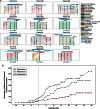Intestinal domination and the risk of bacteremia in patients undergoing allogeneic hematopoietic stem cell transplantation
- PMID: 22718773
- PMCID: PMC3657523
- DOI: 10.1093/cid/cis580 (V体育官网)
"VSports" Intestinal domination and the risk of bacteremia in patients undergoing allogeneic hematopoietic stem cell transplantation
Abstract
Background: Bacteremia is a frequent complication of allogeneic hematopoietic stem cell transplantation (allo-HSCT). It is unclear whether changes in the intestinal microbiota during allo-HSCT contribute to the development of bacteremia VSports手机版. We examined the microbiota of patients undergoing allo-HSCT, and correlated microbial shifts with the risk of bacteremia. .
Methods: Fecal specimens were collected longitudinally from 94 patients undergoing allo-HSCT, from before transplant until 35 days after transplant. The intestinal microbiota was characterized by 454 pyrosequencing of the V1-V3 region of bacterial 16S ribosomal RNA genes. Microbial diversity was estimated by grouping sequences into operational taxonomic units and calculating the Shannon diversity index. Phylogenetic classification was obtained using the Ribosomal Database Project classifier V体育安卓版. Associations of the microbiota with clinical predictors and outcomes were evaluated. .
Results: During allo-HSCT, patients developed reduced diversity, with marked shifts in bacterial populations inhabiting the gut. Intestinal domination, defined as occupation of at least 30% of the microbiota by a single predominating bacterial taxon, occurred frequently. Commonly encountered dominating organisms included Enterococcus, Streptococcus, and various Proteobacteria V体育ios版. Enterococcal domination was increased 3-fold by metronidazole administration, whereas domination by Proteobacteria was reduced 10-fold by fluoroquinolone administration. As a predictor of outcomes, enterococcal domination increased the risk of Vancomycin-resistant Enterococcus bacteremia 9-fold, and proteobacterial domination increased the risk of gram-negative rod bacteremia 5-fold. .
Conclusions: During allo-HSCT, the diversity and stability of the intestinal flora are disrupted, resulting in domination by bacteria associated with subsequent bacteremia VSports最新版本. Assessment of fecal microbiota identifies patients at highest risk for bloodstream infection during allo-HCST. .
Figures



References
-
- Junghanss C, Marr KA, Carter RA, et al. Incidence and outcome of bacterial and fungal infections following nonmyeloablative compared with myeloablative allogeneic hematopoietic stem cell transplantation: a matched control study. Biol Blood Marrow Transplant. 2002;8:512–20. - PubMed
-
- Blijlevens NM, Donnelly JP, de Pauw BE. mucosal barrier injury depends on conditioning regimen. Bone Marrow Transplant. 2005;35:707–11. - PubMed
-
- Jaffe D, Jakubowski A, Sepkowitz K, et al. Prevention of peritransplantation viridans streptococcal bacteremia with early vancomycin administration: a single-center observational cohort study. Clin Infect Dis. 2004;39:1625–32. - PubMed
-
- Castagnola E, Bagnasco F, Faraci M, et al. Incidence of bacteremias and invasive mycoses in children undergoing allogeneic hematopoietic stem cell transplantation: a single center experience. Bone Marrow Transplant. 2008;41:339–47. - PubMed
V体育安卓版 - Publication types
MeSH terms (VSports手机版)
- VSports最新版本 - Actions
- "V体育安卓版" Actions
- Actions (V体育安卓版)
- Actions (VSports手机版)
- "VSports在线直播" Actions
Substances (VSports注册入口)
- Actions (V体育ios版)
V体育ios版 - Grants and funding
VSports在线直播 - LinkOut - more resources
VSports注册入口 - Full Text Sources
Other Literature Sources
V体育平台登录 - Medical
Research Materials

